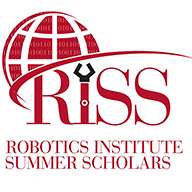Carnegie Mellon University
Toward Invariant Visual Inertial State Estimation using Information Sparsification
Abstract In this work, we address two current challenges in real-time visual-inertial odometry (VIO) systems - efficiency and accuracy. To this end, we present a novel approach to tightly couple visual and inertial measurements in a fixed-lag VIO framework using information sparsification. To bound computational complexity, fixed-lag smoothers perform marginalization of variables but consequently deteriorate accuracy and [...]
Generative Point Cloud Modeling with Gaussian Mixture Models for Multi-Robot Exploration
Autonomous exploration in rich 3D environments requires the construction and maintenance of a representation derived from accumulated 3D observations. Volumetric models, which are commonly employed to enable joint reasoning about occupied and free space, scale poorly with the size of the environment. Techniques employed to mitigate this scaling include hierarchical discretization, learning local data summarizations [...]
Carnegie Mellon University
Integrating Model-based Planning with Skill learning for Mobile Manipulation
With an ever-growing demand to automate different day-to-day activities, the task of autonomous manipulation using articulated robots has gained serious traction lately. In this regard, motion planning for manipulation is one of the highly researched topics. The Motion planning for manipulation is often cast as either a model-based planning problem or a machine learning problem. However, both of these [...]
Learning Multi-Modal Navigation for Unmanned Ground Vehicles
Abstract: A robot that operates efficiently in a team with a human in an unstructured outdoor environment must be able to translate commands from a modality that is intuitive to its operator into actions. This capability is especially important as robots become ubiquitous and interact with untrained users. For this to happen, the robot must [...]
Carnegie Mellon University
In-Field Robotic Leaf Grasping and Automated Crop Spectroscopy
Agricultural robotics is a growing field of intelligent automation that is proving to drastically increase the speed and reliability of in-field tasks such as precision seed planting, harvesting, field mapping, and crop monitoring. More specifically, plant breeders are beginning to use robotic systems to record the physical traits of crops throughout the growing season at [...]
Carnegie Mellon University
Soft-matter Artificial Muscle by Electrochemical Surface Oxidation of Liquid Metal
Natural muscles, a result of more than 500 millions years of evolution, are elegant machines that generate force and motion electrochemically. The brief history of robotics does not have the luxury of millions of years to reverse-engineer many aspects of life. The development of artificial muscles therefore seeks to build more muscle-like actuators for robots. [...]
Radiation Source Localization using a Gamma-ray Camera
Radiation source localization is a common and critical task across applications such as nuclear facility decommissioning, radioactive disaster response, and security. Traditional count-based sensors (e.g. Geiger counters) infer range to the source based on the observed number of gamma photons, expected source strength, and assumed intermediate attenuation from the environment. In cluttered 3D settings, such [...]
Carnegie Mellon University
Improving Imitation Learning through Efficient Expert Querying
Learning from demonstration is an intuitive approach to encoding complex behaviors in autonomous agents. Learners have shown success in challenging tasks like autonomous driving, aerial obstacle avoidance, and information gathering, through observation and mimicry alone. State of the art algorithms like Dataset Aggregation (DAgger) have made significant advances over traditional behavior cloning, demonstrating strong theoretical [...]
Carnegie Mellon University
Provably Optimal Design of a Brain-Computer Interface
Abstract: Brain-computer interfaces are in the process of moving from the laboratory to the clinic. These devices act by reading neural activity and using it to directly control a device, such as a cursor on a computer screen. Over the past two decades, much attention has been devoted to the decoding problem: how should recorded [...]
RI Summer Scholars Poster Session Today at 3:30pm in the NSH Perlis Atrium
Come celebrate the contributions of the cohort members, mentors, program partners, and volunteers that make the program possible. Refreshments will be served.








